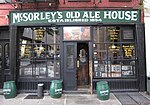St. Mark's Comics
St. Mark's Comics was a New York City comic book retailer in Manhattan. The company opened its first store, at 11 St. Mark's Place, in 1983. For a period, the store had two other locations, one in Lower Manhattan and one in Brooklyn Heights. In late January 2019, St. Mark's Comics announced it would be going out of business at the end of February 2019. On July 30, 2021, St. Mark's Comics re-opened at a new location in Industry City, Brooklyn.The store's St. Mark's Place location was noted for its underground sensibility and cluttered, over-stuffed decor, and for employing female staff members long before that became the norm in the comics retailing industry. In addition to comics, graphic novels, and manga, St. Mark's Comics sold trading cards, action figures, toys, T-shirts, and other pop culture collectibles.
Excerpt from the Wikipedia article St. Mark's Comics (License: CC BY-SA 3.0, Authors).St. Mark's Comics
Saint Mark's Place, New York Manhattan
Geographical coordinates (GPS) Address Nearby Places Show on map
Geographical coordinates (GPS)
| Latitude | Longitude |
|---|---|
| N 40.72945 ° | E -73.98899 ° |
Address
Saint Mark's Place 11
10003 New York, Manhattan
New York, United States
Open on Google Maps








